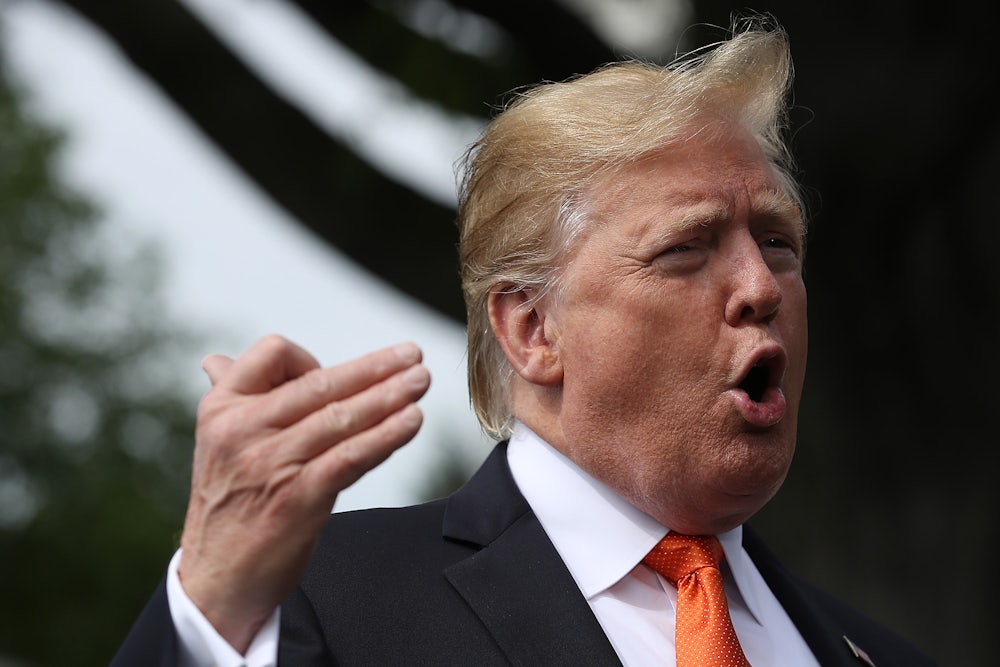Every schoolkid learns about the separation of powers at some point. Maybe a jaunty Schoolhouse Rock! episode taught them how the Constitution divides those powers between the legislative, executive, and judicial branches. Perhaps their civics teacher explained how those branches act as checks on each other to prevent abuses of power. Now President Donald Trump is eager to write a new chapter in their textbooks.
Every president squabbles with Congress about its oversight powers at some point. But Trump’s approach is different. Rather than weigh the validity of each request for information from House Democrats, he’s refusing to abide by any of them. “We’re fighting all the subpoenas,” Trump told reporters on Wednesday. “These aren’t, like, impartial people. The Democrats are trying to win 2020.” Trump isn’t just chafing against the elementary idea of checks and balances; he’s rejecting the concept itself.
At the same time, Democrats are debating whether Trump’s actions over the past two years are enough to justify his impeachment. If they decide in the affirmative, they would need to convince America that his threat to the nation’s constitutional order is so great and immediate that the 2020 election is too distant to wait for the nation’s verdict. But Trump might beat them to it.
Some of the president’s clashes with Congress aren’t that surprising. During the 2016 election, he broke with four decades of precedent by refusing to release his tax returns. That raised questions about whether he had any outstanding foreign debts, which could increase the risk of foreign leverage over him, as well as any potential conflicts of interest from his sources of income. To that end, the House Ways and Means Committee formally requested Trump’s returns from the IRS earlier this month.
There’s a federal statute from the 1920s that allows the tax committees to request any individual’s tax returns, but Trump’s personal lawyers have put forward a dubious legal argument to keep them secret. (They’ve made similar arguments to block other House committees from obtaining the returns.) It’s a cynical gambit. Even if the courts rule against Trump, the legal proceedings might still run out the clock before the 2020 election. In any event, the Treasury Department is slow-walking its decision on whether to turn them over until then.
If you’re feeling generous toward the Trump administration, you might forgive them for challenging Democrats’ novel use of an old statute. But far more mundane oversight matters are also facing stiff resistance.
Earlier this week, the White House Counsel’s Office told Carl Kline, a former White House personnel security director, not to comply with a House Oversight Committee subpoena over his role in the security clearance process for White House staffers. The White House also told lawmakers this week that it would forbid Don McGahn, the former White House counsel, and other White House aides from testifying in relation to the Mueller report. (McGahn told Mueller’s team that he foiled two separate attempts by the president to fire the special counsel.) The White House reportedly signaled it would invoke executive privilege to keep McGahn and other aides away from lawmakers—a legally questionable move given that Trump already waived that privilege so they could talk to Mueller in the first place.
The Justice Department is stonewalling House Democrats, too. After the House Intelligence Committee subpoenaed the unredacted version of special counsel Robert Mueller’s report last week, a Justice Department spokesperson described the request as “premature and unnecessary.” Attorney General Bill Barr rejected a House Oversight subpoena for John Gore, a top official in the department’s Civil Rights Division, over the Trump administration’s attempt to add a citizenship question to the 2020 Census. Barr said he would comply only if a Justice Department lawyer could be present during the deposition.
In isolation, none of these standoffs would be cause for great alarm. The system is designed for a certain level of friction between the legislative and executive branches. In a way, it’s almost more troubling if there’s no friction at all. When Republicans controlled both chambers of Congress in 2017 and 2018, they largely avoided hearings or subpoenas related to the Trump administration’s myriad scandals. The House Intelligence Committee was the exception that proved the rule: Its GOP majority worked tirelessly to undermine the Russia investigation on Trump’s behalf.
In the aggregate, however, the White House’s obstinacy suggests a deeper problem. Presidents are supposed to accept the principle that Congress can act as a meaningful check on their power. Trump does not. His resistance to scrutiny isn’t limited to Congress, of course. The president habitually complains that mainstream news outlets don’t show him the deference he thinks he deserves. “In the ‘old days’ if you were president and you had a good economy, you were basically immune from criticism,” he fumed on Twitter earlier this week. Trump’s hunger for a fawning press was already bad; his authoritarian craving for the same treatment from Congress is worse.
It’s possible that this all-or-nothing approach could eventually backfire on Trump in court. It was already hard to argue that his resistance sprung from a good-faith attempt to preserve the executive branch’s powers. If anything, his categorical public refusal to cooperate with Congress only makes explicit what was already implicit. Then again, the Supreme Court still might not care. Even when faced with clear evidence of the Trump administration’s bad faith, the court’s conservative justices have chosen to pretend that nothing is amiss.
There’s a certain irony to the timing of these all-out efforts to block congressional oversight. Democrats have spent the past two years arguing that Trump’s authoritarian tendencies and disinterest in the rule of law would endanger American democracy. The president doesn’t seem interested in disputing the Democrats’ portrayal of him beyond soundbites like “No obstruction!” If anything, he seems almost eager to prove them right.
